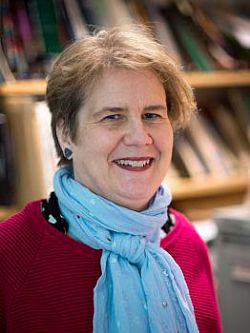IWD 2016: Lizzie Thynne - It's not easy for women to be taken seriously in the film industry
Lizzie Thynne, is Course Convenor of the MA Digital Documentary and also teaches documentary theory and practice, and media theory to undergraduates. She is working on a film/music project called Brighton Symphony of a City, commissioned for this year’s Brighton festival.
 Lizzie Thynne
Lizzie Thynne
I knew I would never be a good actress but I loved drama. I did a degree in English at the University of York and had planned to go to Canada to do theatre studies so I could direct plays, but then I fell in love while teaching English in Florence and decided to stay in Europe.
My MA in English Renaissance literature at Sussex changed the way I saw things. It was Marxist and radical and I found it very challenging because I’d done a more traditional BA. It was taught by remarkable people, such as Peter Stallybrass and Alan Sinfield. I was inspired by the feminist intellectuals here such as Jacqueline Rose and Cora Kaplan.
Then I started a PhD in renaissance literature - my heart wasn’t in the topic I chose it but I learnt so much about historicizing cultureI did a lot of teaching in Womens’ Studies evening classes. Courses on the history of sexuality were the most popular, especially one I ran called “Wanton Wenches and Wayward Wives”.
My adult education teaching got me a job at Tyneside Cinema, doing outreach work. I got the chance to work on film festivals as well as producing events and courses around the cinema programme. When the job ended I started to work as a researcher and later became a documentary director.
For my first job I had a great time going round the Northern working men’s clubs watching drag acts while researching a film about men performing as women on stage. I wrote a quirky script with director Penny Woolcock, who wanted the drag acts to perform Shakespeare. The Arts Council threw up their hands in horror and the film never got funded, but it made me determined to go on and train in film at Bristol.
When I came back to Sussex as a lecturer years later I found students keen to exchange ideas I developed a film about Claude Cahun with Louis Bailey (MA Art History). Cahun was a cross-dressing female dandy and one of the 20thCentury’s greatest yet little-recognised photographers. The film, Playing a part, is still being shown at museums and exhibitions around the world and is currently in a special display on women at war at The Imperial War Museum North in Salford.
Only 21% of European feature films are directed by women. There are far more women making documentaries than feature films because it’s still not easy for women to be taken seriously in the film industry. Even in documentaries, it is the likes of Michael Moore – those with big personas who have more of an entertainment element – who are most visible to the general public.
Film festivals such as Birds Eye and Underwire are doing a lot to bring attention to female filmmakers. Within the history of cinema there have been women directors, such as Agnes Varda and Chantal Akerman ,who have tried to make films in experimental and different ways that attempt to reflect aspects of women’s experience.
Students like it that when I teach theory and practice I can bring in my own professional knowledge. I can talk about how the production process and technique affect meaning. They can see the connection between making films and analysing them. I can also use my own work such as the short films I made for Sisterhood and After: The Women’s Liberation Oral History Project to show how to tell a story concisely.
I’m thrilled that Brighton Festival commissioned me and Professor Ed Hughes to make a film about the city – it’s a modern take on a classic silent genre. Brighton, Symphony of a City, is going to be the highlight of this year’s festival – at least for me.
